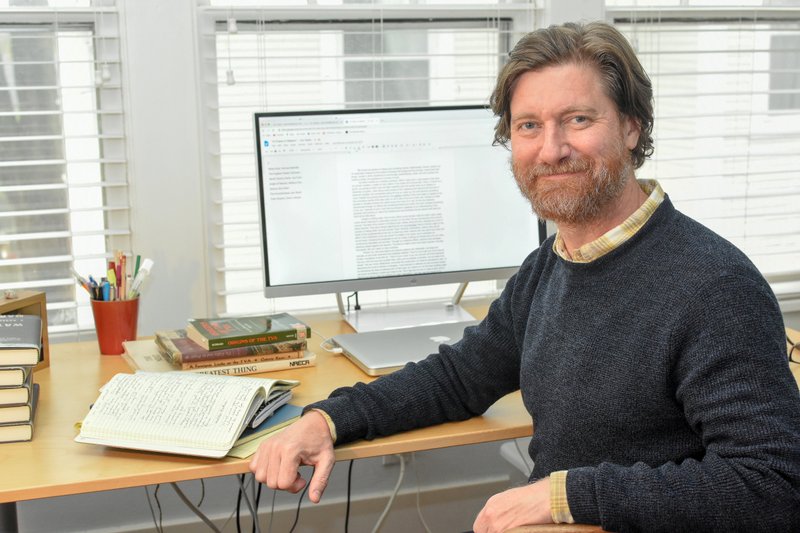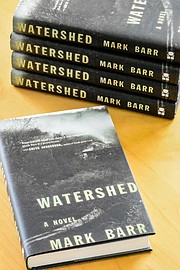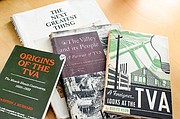It may not be the Pulitzer Prize for fiction or a National Book Award, but for Little Rock novelist Mark Barr, the David J. Langum Sr. Prize in American Historical Fiction, is a very precious honor.
"It's a wonderful surprise, I'm super-honored to have won this," Barr says. "It's been a long road with this book, and it's incredibly gratifying to have it be a happy ending." He received $1,000 and a framed award for his debut novel, Watershed.
Bethany Langum, on the Langum Foundation's website, described Barr's novel as "an immersive historical experience, a pitch-perfect evocation of a time, a place, and a culture." She further praises Barr for painting "a vivid picture of the advent of electricity, the anticipation of how its introduction would change fundamental daily rhythms from time out of mind. The sense of place, from the sticky Southern heat to the cornbread and butter beans, is wholly authentic. Conveyed in prose that simply but effectively illuminates, Watershed would be an accomplishment for any author, and is especially remarkable as a historical fiction debut."
Watershed is a 304-page work published by Hub City Press of Spartanburg, S.C. It hit the marketplace in October. The book is set in post-Depression rural Tennessee and focuses on a brace of characters working and living in the shadow of construction of a hydroelectric dam that promises the gift of electricity.
Publishers Weekly called Watershed "A powerful debut ... readers looking for vivid historicals full of emotional turmoil in the vein of Wallace Stegner will enjoy this impressive novel." Booklist concurred: "An impressive debut ... beautifully written, with deeply sympathetic characters and a richly described Tennessee landscape, Watershed brings a unique chapter in American history to vivid life through the eyes of two people working hard to find their place in the story."
A LONG STRUGGLE
But what is not common about Barr and Watershed is the struggle it took to get to publication. He spent roughly two decades writing his novel and then navigating daunting obstacles to get the work in print.
"I think my getting to [publication] isn't that different from other writers," Barr, 50, says. "You are in the dark with a flashlight. Yeah, there were times I despaired. I remember having a long walk with my friend Trent [Stewart] on New Year's Eve in 2016. The question came up, 'What are you going to do this year?' and, for me, it was the same damn thing as it was the year before, which was the novel. The glacial pace of it all was maddening."
Barr graduated from Sylvan Hills High School in 1988. He headed off to Hendrix College and early on took some accounting and business classes.
"I wasn't very happy with business. My mom said, 'Have you thought about being an English major?'"
An interest in writing took hold of Barr at Hendrix. Even then, his enthusiasm to be a creative writer was checked by those around him.
"I was talking to one of my English professors," Barr says. "I really thought I wanted to be a writer. I have to say he was not super encouraging."
After earning his English degree from Hendrix in 1992, Barr got a job in advertising, working in Little Rock on campaigns such as TCBY yogurt during the day and writing his first short stories at night and during any free time he had.
"I had a story published in the Wisconsin Review. I won the Little Rock Free Press Short Story contest in 1994. We waited late one night for them to drop off the new Free Press at Vino's. They were publishing the story. That was exciting."
'DOING RESEARCH'
Around this time, Barr was exposed to the idea that would eventually become Watershed.
"I think in '95 I learned about electric cooperatives," Barr says. "I was doing research for an ad campaign and materials about electrical cooperatives were sent over for me to study. I was stunned about this major divide where some people had electricity and some people don't. It's like it is today with high-speed internet. We are pretty good about creative divides in this country."
The idea intrigued Barr, but even the bare outline of a novel was years away.
"I didn't have my main characters, Claire and Nathan. I didn't know about the Tennessee Valley Authority."
In the late 1990s, Barr left advertising. He moved to Iowa and completed a computer science degree from the University of Iowa. He resettled in Austin, Texas, where his fresh computer credentials served him well as the dot.com craze — the explosion of the internet industry — was in full swing.
"I had recruiters leaving messages on my machine after I graduated," Barr says. "I started working at Infoglide, a search engine company."
Barr was still committed to his writing goals. He enrolled in the graduate writing program at nearby Texas State University. The graduate school environment was nourishing, especially for a writer who could only tackle the work in fits and starts.
"Texas State is 28 miles from Austin," he says. "It made for long days. The atmosphere was very legitimizing. You are reading a lot. Classmates are writing."

Barr marks this time as the real beginning of Watershed.
"In 2001, I had this vision. There was a boy playing in the dirt outside. The man dressed in city clothes is sweaty and dragging a suitcase. That's the image that got it started, but it's not in the book. The scene is no longer there."
HAPPENED BY ACCIDENT
Seven years passed and Barr figured he was "three-fifths done" with the first draft. A significant development in the next phase happened by accident.
"I went to the AWP [Association of Writers & Writing Programs] in New York in 2008. I was thinking I should get an agent. There is no mechanism for getting an agent. But while I was in New York for this conference, I met a woman at a bar and, during the course of our conversation, I explained what I was doing. She put me in touch with her friend, who was an agent."
The agent expressed interest in taking on Barr as a client, but Barr had to finish his draft of the novel first. After a mad dash that featured several long nights, Barr got to the end.
"I finished it, [the agent] accepted it and I am convinced that I had arrived.
"Spoiler alert: I hadn't."
Barr's new agent sent Watershed to 15 publishers and over the course of several months, they all passed on it. Barr compared it to the slow deflation of a balloon.
"I loved the book," Barr says. "And it failed. Then I tried to write a different book."
NOT GIVING UP
The idea that someone would put years into a project, have it rejected so completely and then not walk away for good is likely foreign to many people.
"For me and my personal point of view, writing takes a certain amount of psychological durability," Barr says. "You have to suffer for so long."
By 2011, Barr returned to Little Rock and worked construction jobs with his father. He met Kristi McKim, a professor at Hendrix College. The two hit it off and were soon married. All the while, Barr worked on his second novel. He finished it in a couple of years and sent it to his agent. The agent took six months to respond.
"When she finally responded, she severed the relationship. She was going to work in Young Adult novels and other areas. I was back at square one."
In 2013 Barr and his wife's first son, Henry, was born. George arrived four years later.
"My work is all the better for having my wife and children in my life," he says. "Kristi is my first and best reader. I couldn't do any of this without her and the smart, emotive manner in which she approaches the world."
Barr returned to his work as a software engineer. His free time shrinking, he took a few more years to rewrite his first novel.
"At that point I set the second book aside and took up Watershed again, seeing it anew," he says. "I spent two to three years rewriting it."
TIME HAD PASSED
Though it would seem silly to rewrite a novel that had already been turned down by publishers, Barr saw an opening that was possible thanks to all the time that had passed.
"I was advised to submit Watershed again," he says. "Most of the editors at publishing houses that rejected it the first time were not there anymore. It's a brutal business."
How was the rewrite different?
"The first draft of Watershed had a lot of lovely moments, but it didn't have much to draw the reader along toward the end. I was at a low point when I picked up Watershed again and saw that, with the distance of a few years, what I could do to make it better. As Steven Pressfield wrote in The War of Art, all art is a struggle and the writer is best served by embracing that fight, that it is important to focus on the day-to-day grind and appreciate the small victories it offers rather than placing all your hopes on some grand, final achievement. I must have taken his point to heart because I just stayed in there, slogging my way through."
Barr says working in advertising, with its deadlines, helped "steer me away from the idea that I could only write when the muse was available."
The second novel is still on his computer's hard drive; Barr is about halfway through his third, a World War II novel that deals with the German rocketry program, an Austrian linguist and an American expat from Memphis.
A reader since childhood, Barr says reading William Faulkner in college opened up the world of Southern literature.
"I've been inspired by so many others — Cormac McCarthy, Rachel Kushner and Jonathan Lethem are a few. Arkansas has a rich vein of writers who inspire me every day, including Kevin Brockmeier, Guy Choate, Jeffrey Condran, Hope Coulter and so many others."
TRIALS AND TRIBULATIONS
One of Barr's best friends is Little Rock novelist Trent Stewart, author of Flood Summer and "The Mysterious Benedict Society" series. Stewart and Barr became friends at Hendrix College. Stewart has followed the trials and tribulations of Watershed from the start.
"[Watershed] was a strong manuscript when it didn't sell that first time," Stewart says. "Other first works wouldn't have stood up over those years. It helped that it was that good when he returned to it years later ...."
Barr says his two decades of work in software development made him a better writer.
"A piece of software is made up of thousands, if not tens of thousands, of lines of code. It can take months or years to write a full application. That work helped train my mind to expect daily, incremental progress toward a larger goal. That is the space you have to live in if you're going to write any book-length project."
In 2017, Barr landed another agent. In November 2018, Hub City Press agreed to publish Watershed. Eleven months later Barr's labor of love is a physical object in the real world. In all, he says he has had about 22 readings and book-signing events since publication.
"It was thrilling to encounter readers I had never met who were excited about the book."
A month or so after its October release, Barr held a signing and reading at White Water Tavern. The bar was filled with friends and family who lined up to buy copies of Watershed; they clearly relished this happy, long, time-coming occasion. Before Barr read from his novel, he acknowledged all the people who helped him along the way. During the reading, his two sons wandered up on the small stage and tried to get his attention. Barr held Watershed in one hand and one of his sons to his side with his other.
"It's all been worth it," Barr says. "There was no guarantee I would get to this point. I think my story is ultimately one of rewarded perseverance, so I hope it encourages aspiring writers to keep going."
Style on 04/12/2020



